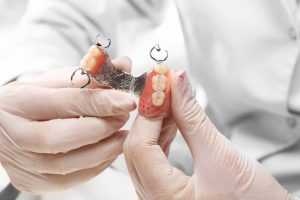 If you are missing teeth then dentures are one of the options that you might be considering to replace them. Almost everyone is suitable for dentures but some people might have more difficulties getting used to them than others. The sooner you consider your options for tooth replacement, the more likely you are to have an easier time adapting.
If you are missing teeth then dentures are one of the options that you might be considering to replace them. Almost everyone is suitable for dentures but some people might have more difficulties getting used to them than others. The sooner you consider your options for tooth replacement, the more likely you are to have an easier time adapting.
You may have options when choosing dentures. If you are only missing some of your teeth, and the others are healthy, you might be able to consider a partial denture. These fill in the gaps that you have. They are supported on your remaining teeth so those need to be strong enough to do the job. If you only have a few teeth left or have serious deterioration in your remaining teeth then a dentist, like Elmsleigh House Dental Clinic in Farnham, will talk to you about extraction.
Fitting for your dentures
It is important to get a good fit for your dentures. Many of the issues that people encounter in the long term are due to a poor fit. If you have had teeth extracted then you may be offered a temporary set of dentures initially. Your gums shrink when they heal and so it is best to get your permanent set fitted after they have time to do this.
Getting used to your dentures
Two of the main behaviours that patients have to get used to after getting dentures are eating and speaking. The trick is to give yourself time and be patient during this period so that you do not feel frustrated.
Your dentist will give you detailed advice on food choices. You will be able to eat most things but you may need to change the way you prepare foods during the cooking process and when you are having a meal. For example, you should avoid tearing at fibrous or crunchy foods with your front teeth. An apple, for example, will be easier to eat if you cut slices off with a knife and use your back teeth to chew.
For some people, their speech is not affected. Others may find that they need to speak more slowly at first. This changes over time. You will find that you can speak normally again once you get used to the way that your dentures sit in your mouth.




